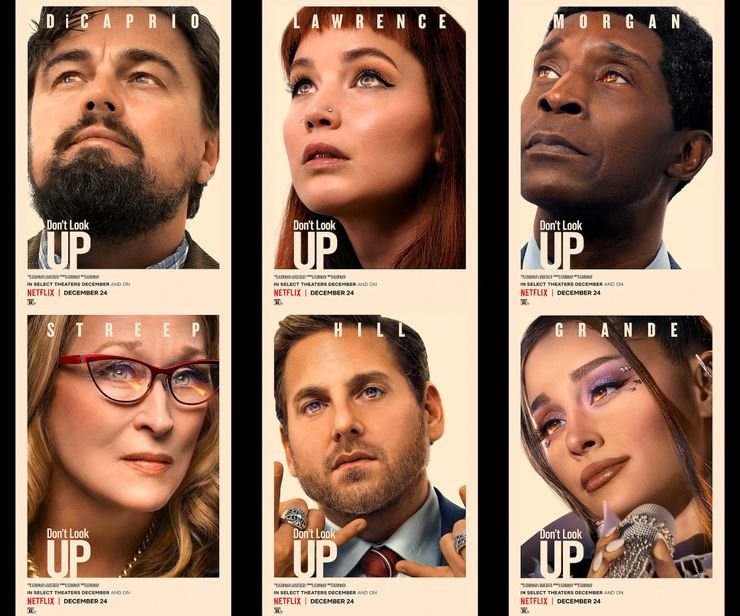Everybody has different tastes in movies, and so I recommend the ones I love with a grain of salt. But I loved Don’t Look Up.
Available on Netflix, Don’t Look Up is classic satire. I haven’t seen one like it in years, and I found it smart and compelling. After I watched it the first time, I almost immediately watched it again.
Leonardo DiCaprio and Jennifer Lawrence star as two astronomers attempting to warn humanity about an approaching comet that will destroy human civilization. The movie’s talented cast includes Meryl Streep, Cate Blanchett, Tyler Perry and Jonah Hill.
Looking online just now, I discovered it’s been getting mixed reviews. It surprised me a bit since this film hit home for me, dealing with very serious topics about humanity and our climate crisis.
And I love a good satire. I get to laugh at things in our society that actually scare the pants off me!
The movie resonates with me in terms of the absurdity of our recent politics and the power of Machiavellian leaders and corporate conglomerates. It parodies some of the real-life figures that have power in our world today and possess those characteristics that have long corrupted people in power: greed, the desire to stay in power at all costs, a loss of perspective and morals, and a sense of superiority. And when it comes to the climate crisis, duplicitousness and self-serving stand in the way of real action.
I found it refreshing to see them represented on screen in a way that allows you to marvel at the absurdity of it all. I’ll admit that through comedy is sometimes the only way I can handle the news these days!
Don’t Look Up was written, produced, and directed by Adam McKay. He wrote the script before the pandemic, and the cast filmed in isolation in 2020 before the vaccination was available, which sounds fairly challenging for the film’s production and post-production.
The movie reminds me a bit of another classic satire, Stanley Kubrick’s Dr. Strangelove or: How I Learned to Stop Worrying and Love the Bomb, the 1964 black comedy film that satirizes the Cold War fears of a nuclear conflict between the Soviet Union and the United States.
Some critics have called the movie uneven. I side with a review I read in the Sydney Times. Writer Garry Maddox says, “I’m siding with the minority of critics who have stepped away from judging Don’t Look Up for falling short of being a cinematic masterpiece and loved the ambition, ideas and anarchic energy. It deserves respect as a provocative movie about our inability to confront the threat of climate change.”
Peter Kalmus, a climate scientist at NASA's Jet Propulsion Lab, wrote in The Guardian “Speaking as a climate scientist doing everything I can to wake people up and avoid planetary destruction, it’s the most accurate film about society’s terrifying non-response to climate breakdown I’ve seen. The scientists [in the movie] are essentially alone with this knowledge, ignored and gaslighted by society. The panic and desperation they feel mirror the panic and desperation that many climate scientists feel.”
Kalmus goes on to details the grim political response in the US: “We live in a society in which, despite extraordinarily clear, present and worsening climate danger, more than half of Republican members of Congress still say climate change is a hoax and many more wish to block action, and in which the official Democratic party platform still enshrines massive subsidies to the fossil fuel industry.”
For me, with the denial of both a climate crisis and a health crisis, this satire feels very close to reality. In some ways, our recent reality has felt more absurd than fiction.
Kalmus says, “After 15 years of working to raise climate urgency, I’ve concluded that the public in general, and world leaders in particular, underestimate how rapid, serious and permanent climate and ecological breakdown will be if humanity fails to mobilize. There may only be five years left before humanity expends the remaining “carbon budget” to stay under 1.5C of global heating at today’s emissions rates – a level of heating I am not confident will be compatible with civilization as we know it. And there may only be five years before the Amazon rainforest and a large Antarctic ice sheet pass irreversible tipping points.”
Anyway, if you watch Don’t Look Up and don’t like it, that’s okay. To each their own. But maybe the movie will make more people talk about the issues addressed, think about them, elect officials and support companies that will do something to address climate change.
Life informs art, but art also informs life. It’s always been that way. Just like the potential global nuclear destruction addressed in Dr. Strangelove, this comedy is about a serious situation that we’re all facing, like it or not. We just need to “Look up.”

